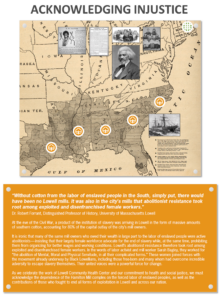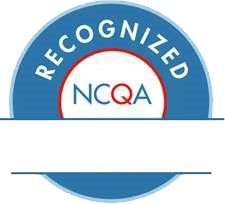In honor of Juneteenth, 2022, we installed a new panel on our 50th Anniversary timeline titled, “Acknowledging Injustice” recognizing that without the labor of enslaved workers in the South, the Health Center’s home in the historic Hamilton Mill building would not exist.
“Without cotton from the labor of enslaved people in the South, simply put, there would have been no Lowell mills. It was also in the city’s mills that abolitionist resistance took root among exploited and disenfranchised female workers.”
– Robert Forrant, Distinguished Professor of History, University of Massachusetts Lowell Community Health Center

At the eve of the Civil War, a product of the institution of slavery was arriving in Lowell in the form of massive amounts of southern cotton, accounting for 80% of the capital outlay of the city’s mill owners.
It is ironic that many of the same mill owners who owed their wealth in large part to the labor of enslaved people were active abolitionists – insisting that their largely female workforce advocate for the end of slavery while, at the same time, prohibiting them from organizing for better wages and working conditions. Lowell’s abolitionist resistance therefore took root among exploited and disenfranchised female workers. In the words of labor activist and mill worker Sarah Bagley, they worked for the abolition of Mental, oral, and Physical Servitude, in all their complicated forms.” These women joined forces with the movement already underway by Black Lowellians, including those free-born and many who had overcome incredible adversity to escape slavery themselves. Their united voices were a powerful force for change.
As we celebrate the work of Lowell Community Health Center and our commitment to health and social justice, we must acknowledge the dependence of the Hamilton Mill complex on the forced labor of enslaved peoples, as well as the contributions of those who fought to end all forms of exploitation in Lowell and across our nation.
Additional Information & Resources
- FILM: A Contradictory Place https://www.youtube.com/watch?v=HdJWHgtrbX0
- RESEARCH: Untold Lowell Stories, Black History, UML https://libguides.uml.edu/c.php?g=1125577
- BOOK: Hidden in Plain Sight, by Christa Brown



